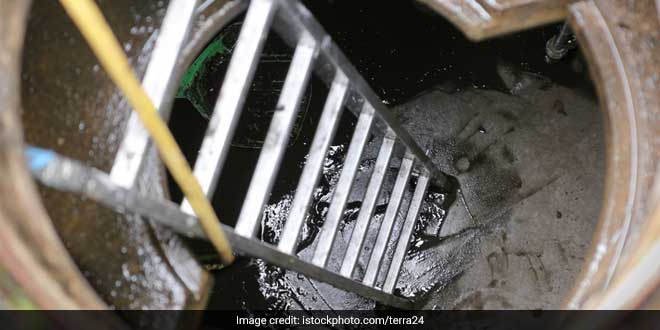Highlights
- A report had identified 233 manual scavengers in Delhi
- Our sewer lines have to be modernized: Activist
- Proper safety gears are not provided to the workers
New Delhi: Toxic fumes inside gutters and sewers have snuffed out seven lives in the national capital within a month, but agencies are busy passing the buck, or washing their hands off by pinning the blame on private contractors. Bezwada Wilson, the national convener of the Safai Karamchari Andolan, said the Delhi Jal Board (DJB) cannot simply get away by saying the workers who died of asphyxiation yesterday were not employed with the agency, as they were cleaning a sewer line owned and maintained by it.
“We are reporting every death to the authorities. Each and every elected representative has been given memorandums detailing the extent of the issue, but nothing is happening. Their hands are soaked in the blood of safai karamcharis,” Mr Wilson told PTI.
Moreover, Section 7 of the Prohibition of Employment as Manual Scavengers and their Rehabilitation Act, 2013, clearly states that no person, local authority or any agency shall engage or employ, either directly or indirectly, any person for hazardous cleaning of a sewer or a septic tank.
Mr Wilson said too often these agencies are absolved of criminality as the workers are not employed directly by them, but by private contractors.
Also Read:Will The Swachh Campaign Finally Tackle The Scourge Of Manual Scavenging?
You have money for bullet trains, but no resources are being spared to put an end to these deaths. Mere tall talk on Swachh Bharat will not suffice. Why do we even have Article 21 providing Right to Life in our Constitution? he said.
Four men had died while cleaning a tank containing poisonous sewage in south Delhi’s Ghitorni in July 15 while three died while cleaning a sewer line in Lajpat Nagar yesterday. In both the cases, the deceased were working for private contractors.
A report prepared by the Delhi State Legal Services Authority (DSLSA), which had identified 233 manual scavengers in Delhi, shows the extent to which workers, without proper safety gears, are cleaning sewers and tanks under private contractors.
The DSLSA had pointed out in its report, which was submitted in the Delhi High Court, that out of these workers, 104 were attached to government agencies while 129 were working as outsourced or private contract workers.
The court had termed as “disgraceful” the existence of manual scavengers in the city.
The Supreme Court, in 2014, had issued a series of directions to all states for strict implementation of the law by acting against violators, and ensure education, employment and rehabilitation of affected people.
Our sewer lines have to be modernised. Most of them date back to the British period. The whole cleaning process must be mechanised. Workers must be provided with safety gears.
When will we introduce technology that can potentially change lives? And one needs to take the bull by the horns and deal with the widely prevalent casteist mindset, which is at the root of manual scavenging, Mr Wilson said.
Also Read: 39 Deaths In 100 Days: How Manual Scavenging Continues To Exist In India Despite It Being Illegal






























